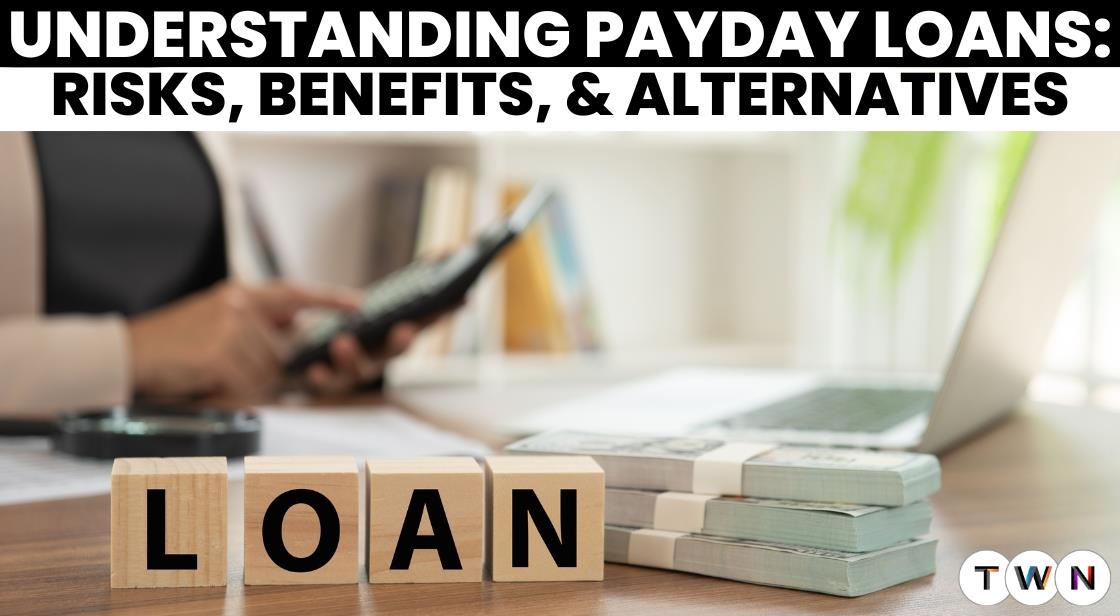Understanding Payday Loans: Risks, Benefits, and Alternatives

Blog Post
In today’s fast-paced world, financial emergencies can arise unexpectedly, often leaving individuals in urgent need of quick cash. For many, payday loans seem like a convenient solution to bridge the gap between paychecks.
Marketed as a fast and easy way to secure funds, these short-term loans come with their own set of complexities and risks. Understanding how payday loans work, their associated dangers, and the viable alternatives available can help you make informed financial decisions and avoid potentially costly pitfalls.
Payday loans are designed to offer immediate relief, but their high-interest rates and short repayment periods can lead to a challenging cycle of debt.
This blog explores the essential aspects of payday loans, including their definition, typical features, and the significant risks they pose, such as exorbitant interest rates and the potential for a debt cycle.
Additionally, we will delve into practical alternatives, such as personal loans, credit card cash advances, and borrowing from friends or family, providing insights into how these options compare to payday loans in terms of costs, benefits, and suitability.
By understanding both the risks of payday loans and the alternatives available, you can better navigate financial emergencies and make choices that align with your long-term financial health.
Whether you’re considering a payday loan or exploring other options, this guide will equip you with the knowledge you need to manage your finances effectively and avoid unnecessary financial strain.
Exploring Payday Loans: What You Need to Know About Risks and Alternatives
What Is a Payday Loan?
Definition and Explanation
A payday loan is a short-term, high-interest loan designed to provide quick cash to borrowers who need immediate financial relief. These loans are typically intended to cover urgent expenses until the borrower receives their next paycheck. Payday loans are often marketed as a convenient way to bridge the gap between pay periods, but they come with significant risks due to their high costs and short repayment terms.
Typical Features of payday loan
-
Short-Term Nature: Payday loans are usually due on the borrower’s next payday, which is typically within two to four weeks of the loan date. This short repayment period means borrowers must repay the loan quickly, often within a single pay cycle.
-
High-Interest Rates: Payday loans are known for their high-interest rates, which can be significantly higher than those of traditional loans or credit cards. The Annual Percentage Rate (APR) for payday loans can exceed 400%, reflecting the high cost of borrowing.
-
Repayment Structure: The repayment structure of payday loans is generally straightforward. Borrowers must repay the loan in full, including all interest and fees, on or before their next payday. This lump-sum repayment can be challenging for many borrowers, especially if they have additional financial obligations.
How Payday Loans Work
-
Application Process: To apply for a payday loan, borrowers typically need to visit a payday lender's physical location or apply online. The application process is usually quick and requires minimal documentation, such as proof of income, identification, and a bank account. Some lenders may perform a basic credit check, but the emphasis is on immediate approval rather than creditworthiness.
-
Borrowing Terms: After approval, the borrower receives the loan amount, which is often small, ranging from $100 to $1,000. The lender may require the borrower to write a postdated check or authorize an electronic debit from their bank account for the repayment date. If the borrower is unable to repay the loan on time, they may face additional fees or penalties, leading to a cycle of debt.
Risks of Payday Loans
High-Interest Rates
Explanation of APR (Annual Percentage Rate): Payday loans are known for their exorbitant interest rates. The APR for payday loans can be extraordinarily high, often exceeding 400% annually. This is because payday lenders typically charge a fixed fee for each $100 borrowed, which translates into a high-interest rate when calculated over a year.
Comparison with Other Types of Credit: Compared to traditional credit options like personal loans or credit cards, payday loans have significantly higher interest rates. For instance, personal loans might offer APRs between 6% and 36%, and credit cards typically range from 15% to 30%. The stark difference highlights the costliness of payday loans.
Debt Cycle
How Payday Loans Can Lead to Repeated Borrowing
Payday loans are short-term loans intended to be repaid by the borrower's next payday. Due to their high cost and short repayment period, borrowers often find themselves unable to repay the loan on time. This may force them to take out a new payday loan to cover the old one, creating a cycle of debt.
Example Scenarios of Debt Cycle: For example, if a borrower takes out a payday loan of $500 with a $75 fee, they may struggle to repay the full amount by the due date. They might then roll over the loan, incurring additional fees. This cycle can quickly spiral out of control, with accumulating fees and debt that grows more unmanageable over time.
Fees and Charges
Typical Fees Associated with Payday Loans: Payday loans usually come with high fees. A common fee structure is $15 to $30 for every $100 borrowed. These fees can accumulate rapidly, significantly increasing the total repayment amount.
Impact on the Total Repayment Amount: For example, borrowing $500 with a $75 fee means a borrower will repay $575. If the loan is rolled over or extended, additional fees are added, further inflating the total amount owed.
Impact on Credit Score
How Missed Payments Can Affect Credit Scores: Missing payments on payday loans can negatively impact credit scores. Lenders often report non-payment to credit bureaus, which can result in a lower credit score and make it more difficult to obtain credit in the future.
Potential Long-Term Financial Impacts: A lower credit score can lead to higher interest rates on future loans, increased insurance premiums, and difficulties in securing housing or employment. The long-term financial implications of damaged credit can be severe, affecting various aspects of a borrower's financial life.
Also Read: Best Practices for Leaders Integrating AI into the Workplace
Regulatory Concerns
Overview of Regulation in Different Regions
Regulations for payday loans vary widely by region. Some areas have implemented strict caps on interest rates and fees, while others have minimal regulation. For example, some U.S. states impose limits on APRs and fees, while others allow higher rates.
Potential Legal Issues and Protections
There are ongoing debates about the legality and regulation of payday loans. Consumer protection laws may offer some safeguards, but in regions with lax regulation, borrowers may face predatory lending practices. Understanding local regulations and seeking legal advice can help mitigate risks associated with payday loans.
Benefits of Payday Loans
Quick Access to Cash
Payday loans offer rapid access to cash, which can be crucial during unexpected financial emergencies. Unlike traditional loans that may take weeks to process, payday loans are typically approved within a day or even a few hours. This immediacy allows borrowers to address urgent expenses such as medical bills, car repairs, or overdue rent without lengthy delays.
Comparison with Other Loan Processing Times
When compared to other types of loans, payday loans stand out for their speed. Personal loans, credit card advances, and other forms of credit often involve extensive paperwork, credit checks, and longer approval processes. In contrast, payday loans streamline the process, providing almost instant funds with minimal hassle.
Minimal Requirements
Typical Requirements for Approval
The approval requirements for payday loans are generally minimal. Most lenders require basic documentation such as proof of income, identification, and a bank account. This simplicity is advantageous for individuals who might not meet the more stringent criteria of traditional financial products.
Ease of Access for Individuals with Poor Credit
Payday loans are accessible even to those with poor credit histories. Unlike traditional loans that heavily rely on credit scores, payday loans focus primarily on current income and ability to repay. This makes them a viable option for people who might be turned away by other financial institutions due to their credit history.
No Long-Term Commitments
Short-Term Nature of the Loan
One of the key benefits of payday loans is their short-term nature. These loans are typically due on the borrower’s next payday, which means the commitment is brief. This short repayment period is beneficial for those who only need temporary financial assistance and want to avoid long-term debt.
Benefits for Those Needing Temporary Assistance
For individuals who find themselves in a temporary financial bind, payday loans can provide a quick solution without extending into long-term repayment plans. This is ideal for managing short-term cash flow issues without the burden of prolonged debt.
Convenience
Application Process and Approval Speed
The application process for payday loans is straightforward and quick. Many lenders offer online applications, allowing borrowers to apply from the comfort of their homes. The approval process is streamlined, often requiring only a few basic steps, which contributes to the overall convenience.
Availability of Online Payday Loans
The availability of online payday loans adds to their convenience. Borrowers can complete the entire process—from application to receiving funds—online, making it accessible regardless of location. This digital convenience suits the fast-paced nature of modern life and provides an efficient solution for urgent financial needs.
Alternatives to Payday Loans
1. Personal Loans
Personal loans offer a viable alternative to payday loans with generally more favorable terms. Unlike payday loans, personal loans typically have lower interest rates and longer repayment periods. This makes them less expensive in the long run. When considering a personal loan, evaluate factors such as APR, loan term, and fees. Benefits include a structured repayment plan and lower monthly payments, but you should consider your credit score and ability to meet monthly payments.
2. Credit Card Cash Advances
Credit card cash advances allow you to withdraw cash up to a certain limit using your credit card. Compared to payday loans, they offer immediate access to funds but often come with higher interest rates and additional fees. Cash advances can be beneficial for their convenience but may lead to higher costs if not paid off quickly. The main drawbacks include higher APRs and the potential for increased debt if not managed carefully.
3. Borrowing from Friends or Family
Seeking financial help from friends or family can be a cost-effective alternative to payday loans. This option typically involves no interest and flexible repayment terms. However, it can strain personal relationships and may come with emotional or social consequences. If choosing this route, approach the situation respectfully and clearly communicate your repayment plan to avoid misunderstandings and maintain healthy relationships.
4. Credit Counseling and Financial Assistance Programs
Credit counseling services offer guidance on managing debt and improving financial habits. Many organizations provide free or low-cost services, including budgeting assistance and debt management plans. These programs can help you create a sustainable financial plan and avoid high-cost borrowing options. They may also offer financial education and resources to prevent future financial crises.
5. Budgeting and Savings Strategies
Effective budgeting and saving can help avoid the need for payday loans. Create a detailed budget to track your income and expenses, and identify areas where you can cut costs. Building an emergency fund can provide a financial cushion for unexpected expenses, reducing reliance on high-cost loans. Regularly saving a small portion of your income can help you prepare for financial emergencies and manage your finances more effectively.
Banks that Provide Payday Loan Alternatives
While traditional payday loans are usually offered by non-bank lenders, some banks and financial institutions provide short-term, small-dollar loans as alternatives to payday loans. These options often come with better terms, lower interest rates, and more favorable repayment conditions.
1. Federal Credit Unions (FCUs)
Many federal credit unions in the U.S. offer Payday Alternative Loans (PALs). PALs are designed to help members avoid the high costs associated with payday loans. These loans typically range from $200 to $1,000 and have a maximum interest rate of 28%. Credit unions like Navy Federal Credit Union and PenFed Credit Union offer such alternatives with more manageable terms and lower fees than payday lenders.
2. Wells Fargo
Wells Fargo offers small personal loans that can serve as payday loan alternatives. Their short-term personal loans are available for amounts as low as $3,000, which may help individuals avoid the need for high-cost payday loans. These loans come with fixed rates and flexible repayment terms.
3. U.S. Bank
U.S. Bank provides a Simple Loan option for customers needing short-term funds. This loan offers amounts between $100 and $1,000, with a flat fee depending on the loan amount. It’s a straightforward alternative to payday loans, and customers can repay the loan in three monthly installments.
4. Bank of America
Though Bank of America doesn’t directly offer payday loans, it provides access to low-interest personal loans, which can be used as an alternative to cover short-term financial needs.
Always compare rates and terms when considering a payday loan alternative.
Conclusion
payday loans can provide immediate financial relief for those facing urgent expenses, but they come with significant risks, including exorbitant interest rates, the potential for a debt cycle, and adverse effects on credit scores. Understanding the structure and implications of payday loans is crucial for making informed financial decisions.
While payday loans offer quick access to cash with minimal requirements, their high costs and short repayment periods make them a risky choice for many borrowers. The high APR and potential for repeated borrowing can lead to severe financial strain and long-term consequences.
Fortunately, there are several alternatives to payday loans that can offer more manageable and cost-effective solutions. Personal loans, credit card cash advances, borrowing from friends or family, credit counseling, and budgeting strategies each present different benefits and considerations.
Personal loans and credit card cash advances provide potentially lower costs and flexible options, while borrowing from personal networks or seeking professional financial assistance can offer support without high fees. Implementing effective budgeting and savings strategies is also a proactive way to prevent the need for emergency loans.
Ultimately, while payday loans may seem like a quick fix, exploring these alternatives can help individuals find more sustainable and less costly solutions for their financial needs. By understanding the risks and exploring other options, borrowers can make better choices to manage their finances and avoid falling into the trap of high-cost, short-term debt.
You May Like
EDITOR’S CHOICE












